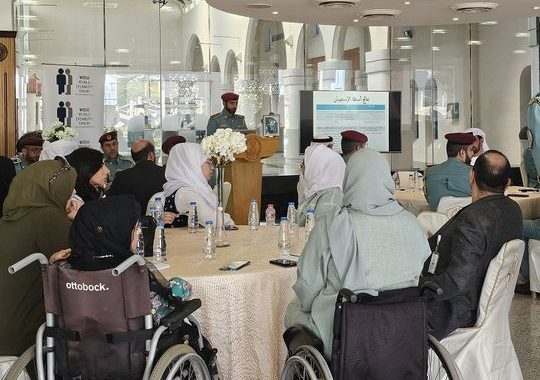Revealed: 2-week thematic agenda for COP28 in UAE

Image Credit: Reuters
Abu Dhabi: The COP28 UAE Presidency has announced a two-week thematic programme for the conference to deliver on four key goals alongside the negotiations process and as part of the critical Global Stocktake response.
Taking place at Expo City Dubai from November 30 to December 12, COP28 UAE will focus on fast-tracking a nequitable energy transition; fixing climate finance; putting nature, and mobilising for the most inclusive COP.
Designed to drive action and implement policy, finance, and technology solutions across these priorities, the two-week programme was developed in consultation with stakeholders including civil society, NGOs, youth, and Indigenous Peoples. Thematic programmes will run in both the Blue and Green Zones. The Blue Zone will be a UNFCCC-managed site, open to accredited party and observer delegates, whereas the Green Zone will welcome delegates and guests of the Blue Zone, the public and private sector, NGOs and the general public.
A six-week open consultation on the thematic areas and sequencing was held in which stakeholders were invited to submit feedback – the first such approach taken by a COP Presidency.
Kicking off with a two-day World Climate Action Summit, during which the first-ever Global Stocktake response will be presented to world leaders with the COP Presidency seeking commitments and accountability, the programme also features new individual thematic days that respond to global challenges.
For the first time at a COP forum, COP28 will dedicate a day to Health, Relief, Recovery, and Peace, with a high level climate health ministerial, among other thematic activities. COP28 will also be the first to focus on the role of trade in tandem with finance and it will be the COP that brings leaders together from across all levels of government and society – from the local mayors to global leaders– to work towards cleaner, greener, safer cities for current and future generations.
All thematic days throughout the two weeks will be underpinned with an inclusive approach that prioritises frontline communities and focuses on how finance, technology and innovation can drive solutions.
More detailed information about each thematic day will be released in the weeks and months ahead, as the COP28 Presidency continues to ramp up preparations for this year’s meeting at Expo City Dubai.
Day-by-day agenda
• November 30: COP28 UAE opens to the world at Expo City, Dubai.
• December 1 and 2: World Climate Action Summit – These two days will see heads of state and world leaders come together to tackle the most pressing climate issues in dialogue with leaders from civil society, business, youth, Indigenous Peoples’ organisations and others. Typically, the summit helps to firm up the ambition for the remainder of the COP. For COP28, it will go further; it is where the first-ever Global Stocktake response and the urgency of the situation faced will be presented, and the COP Presidency will seek accountability from the highest levels of global governance on a way forward.
• December 3: Health/Relief, Recovery, and Peace – Climate change is already impacting human health across the planet, from the quality of the air we breathe to the water we drink and the places that provide us with shelter. It is also a major cause for displacement of vulnerable communities, leading to increased fragility which can compromise peace. This day, a first for COPs, will explore ways to provide relief to those affected while strengthening resilience and recovery leading to increased stability.
• December 4: Finance/Trade/Gender Equality/Accountability – Neither global financial systems that control and impact access and affordability of climate finance nor international trade networks, are working effectively and equitably. It is widely acknowledged that leaders of the global institutions and countries that govern these systems must accelerate and be accountable for an overhaul.
• December 5: Energy and Industry / Just Transition / Indigenous Peoples – The world needs to decarbonise rapidly while continuing to progress economically. It is critical that this development happens sustainably and inclusively to support lives and livelihoods while protecting the planet. This day will focus on how the world can accelerate the energy transition while ensuring it is just.
The energy needed for day-to-day life must remain affordable but become cleaner, and jobs must be retained but expand as green technologies emerge and provide increased and equitable access to opportunities. The day will look at the broad spectrum of solutions from deploying renewable energy at scale and how hydrogen can support this, to decarbonising the energy of today through carbon capture technologies and rapidly reducing methane emissions from oil and gas. It will also focus on heavy-emitting industry including steel, cement, and aluminium.
Indigenous Peoples are stewards of 80 percent of our planet’s biodiversity and Indigenous Peoples Day will recognise the importance of their intergenerational knowledge, practices, and leadership in climate action. The day will also strengthen their role in the just transition, reinforcing the urgency of a fully inclusive, all-of-society approach.
• December 6: Multilevel Action, Urbanisation, and Built Environment/Transport – It is not often that leaders representing all levels of governance, from the local to the global, come together. This day will provide a rare opportunity for mayors and governors, ministers and parliamentarians, and global business and civil society leaders to work together to accelerate climate action solutions across society in every form.
This will include exploring how greener urban mobility systems can be designed to withstand and adapt to climate change while supporting the transition to low carbon built environments and infrastructure, and redesigning our systems of production and consumption to minimise waste. In addition, this day will showcase how all of these solutions contribute to safer, healthier and greener cities for current and future generations.
• December 7: Rest Day
• December 8: Youth, Children, Education, and Skills – Children and youth are facing disproportionate risks and impacts from climate change as the generation who will inherit a planet with tougher conditions in which to live and prosper but which was not responsible for contributing to the problem. This day seeks to empower children and youth to shape the outcomes of COP28 and beyond and provide them with clear, defined, accessible opportunities to be a leading part of the solutions proposed at every level.
• December 9: Nature, Land Use, and Oceans – Our world’s climate and its biodiversity are inextricably interconnected, one cannot exist without the other. Mitigating both crises must therefore be integrated. In a landmark win for nature, a 30 x 30 biodiversity goal was adopted by world leaders at the CBD COP15 – to protect at least 30 percent of the planet’s land and water by 2030. Contributing to the goal, this day will focus on delivering climate and nature co-benefits.
This includes co-designing approaches to land use and oceans conservation with local and Indigenous Peoples to protect and manage biodiversity hotspots and natural carbon sinks.
• December 10: Food, Agriculture, and Water – Climate change is creating severe pressure and risks for the food, agricultural and water systems that ensure human wellbeing. At the same time, these systems are also key contributors to climate change: one third of all human-made GHG emissions derive from agri-food systems, and 70 percent of fresh water consumed worldwide is used for agricultural production.
This day will focus on how to fix this, from scaling up regenerative agriculture and water-food systems that support habitat restoration and conservation and increase food security, to implementing stronger, fairer integrated governance between states and corporations, farmers and producers.
• December 11 and 12: Final Negotiations – On the final two days of COP28, there will be no thematic days to avoid extensive programming when the negotiation text is often being closed.
The full COP28 thematic programme can be accessed at https://www.cop28.com/pdfs/COP28_Thematic percent20Program.pdf.
100-day countdown
The COP28 UAE Presidency today is using the occasion of being 100 days away from the world’s largest annual climate summit, COP28, to call on the world to come to the UAE ready to make transformational and practical progress towards addressing the climate crisis.
This year, under the banner of the ‘Year of Sustainability’, President His Highness Sheikh Mohamed bin Zayed Al Nahyan has rallied the nation to embrace a greener tomorrow. The initiative calls for responsible consumption, conservation, and collective action against climate change. The COP28 Presidency is also using the 100-day milestone ahead of COP28 to remind all UAE residents of the importance of climate action.
Marking 100 days to COP28, Dr Sultan bin Ahmed Al Jaber, Minister of Industry and Advanced Technology and COP28 President-Designate, said: “Eight years after the Paris Climate Agreement, it is now time to reignite hope through unity and action. The countdown to COP28 has begun, marking a pivotal moment to shape our shared future. COP28 embodies collective action, a platform where leaders and citizens from every corner of the world unite to forge a sustainable path forward. The four pillars – fast-tracking the energy transition, fixing climate finance, focusing on people, lives and livelihoods and reinforcing everything with full inclusivity – are our guiding lights, illuminating the way to a greener, healthier, more resilient world. At COP28, the world must unite, act and deliver.”
Power of youth
To empower young people in the UAE, the COP28 Youth Climate Champion, in collaboration with the COP28 Presidency and the Ministry of Culture and Youth, launched the first cohort of the UAE Youth Climate Delegates Programme.
Moreover, the Youth Climate Champion team is bridging the gap between Emirati youth and senior citizens through a series of intergenerational dialogues on key climate topics.
There will also be the 18th edition of the Conference of Youth (COY18), held at Expo in the UAE in November ahead of COP28.
Shamma bint Suhail Faris Al Mazrui, Minister of Community Development and COP28 Youth Climate Champion, said: “We are committed to empowering UAE’s youth by amplifying their voices on climate change and action. Our goal is to not only raise awareness about climate change impacts but also actively involve young people’s perspectives from across the UAE and beyond in the decision-making process at COP28. Youth in the UAE and across the world have the power to positively disrupt the status quo in climate action, accelerating progress and taking us closer towards fulfilling our climate ambitions.”
Blueprint for sustainability
Minister of Climate Change and Environment, Mariam bint Mohammed Almheiri, said: “In the context of the UAE’s ‘Year of Sustainability’ in 2023, the 100 days before COP28 will see a myriad of initiatives unveiled by the Ministry of Climate Change and Environment, along with other pertinent governmental and private entities in the UAE. These endeavours will further our environmental and climate objectives across different sectors. Backed by our visionary leadership, the UAE will host COP28 equipped with a developmental blueprint that emphasises sustainability and reinforces the UAE’s leading position in this crucial domain.”
Razan Al Mubarak, UN Climate Change High-Level Champion for COP28, emphasised the power of unified action through governments and non-state actors coming together to succeed in this shared endeavour.
“A whole of society emergency requires a solution that includes the whole of society. Alongside top-down government action, we need a bottom-up groundswell of action as well by businesses, cities, NGOs, Indigenous Peoples, youth and women to succeed. Climate action must be inclusive of all stakeholders from the global south and global north, and across every sector,” she said.



